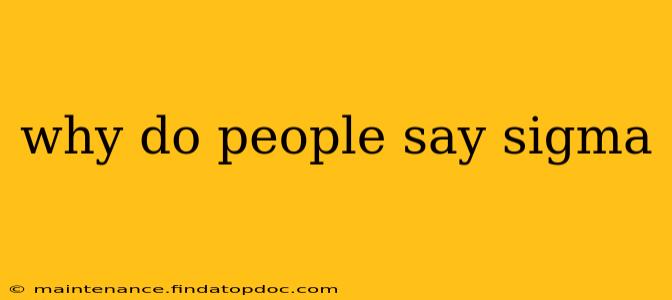Why Do People Say "Sigma"? Deconstructing the Modern Meaning of a Greek Letter
The term "sigma" has transcended its origins in mathematics and Greek letters to become a popular, albeit somewhat controversial, online descriptor. Understanding why people say "sigma" requires exploring its evolution from a statistical symbol to a complex online persona. This exploration will delve into its current usage, examining its connotations, criticisms, and the broader societal context that fuels its popularity.
What Does Sigma Mean in a Statistical Context?
Before delving into its modern usage, it's crucial to understand sigma's original meaning. In mathematics and statistics, sigma (Σ) denotes summation – the addition of a sequence of numbers. This is its purely objective, factual meaning. Its current online usage, however, bears little resemblance to this technical definition.
What Does Sigma Mean Online? The "Sigma Male" Persona
Online, particularly on platforms like TikTok and YouTube, "sigma" is often used to describe a particular male archetype – the "sigma male." This persona is characterized by independence, self-reliance, and a rejection of traditional social norms and hierarchies. Sigmas are often portrayed as loners, operating outside of established social structures, and achieving success on their own terms. They are seen as being unconcerned with societal approval or the pursuit of traditional markers of success, such as wealth or relationships.
This portrayal often includes:
- High self-reliance: Sigmas are presented as self-sufficient individuals who don't rely on others for validation or support.
- Strategic loner behavior: Their isolation is framed not as loneliness, but as a strategic choice to pursue their own goals without external influence.
- Anti-establishment sentiment: They are often depicted as rebelling against societal expectations and norms.
- A focus on self-improvement: This includes physical fitness, mental acuity, and skill development.
Why Do People Identify as or Label Others as "Sigma"?
The appeal of the "sigma male" persona lies in its perceived rejection of mainstream societal pressures. In a world often perceived as competitive and conformist, the idea of achieving success independently, without adhering to traditional rules, holds a certain allure. For some, it represents an aspirational identity, a way to project an image of self-assuredness and freedom. For others, it's a label used to categorize individuals perceived to fit this archetype.
Is the "Sigma Male" Concept Accurate or Helpful? Criticisms of the Term
While the "sigma male" concept has gained traction, it's important to acknowledge its limitations and potential downsides. Critics often point out that:
- It can be toxic: The emphasis on self-reliance can be misinterpreted as a justification for antisocial behavior or a lack of empathy.
- It's often misapplied: The term is frequently used superficially, without a genuine understanding of its nuances.
- It's based on a limited and idealized view of masculinity: The portrayal is often unrealistic and potentially harmful.
The "sigma male" label often ignores the importance of healthy relationships and collaboration. The focus on extreme independence can isolate individuals, neglecting the benefits of community and support networks.
What are the Alternatives to the Sigma Male Label?
Instead of using the potentially problematic "sigma male" label, it might be more helpful to focus on related, but less problematic, positive traits such as:
- Self-reliance: The ability to solve problems and manage one's life independently.
- Resilience: The capacity to overcome challenges and setbacks.
- Independence: The capacity to make independent decisions and follow one's own path.
These positive traits can be acknowledged and celebrated without resorting to potentially harmful stereotypes and generalizations.
In conclusion, the use of "sigma" online is a complex phenomenon reflecting a desire for self-reliance and a rejection of conventional masculinity. However, it's important to approach this label critically, considering its potential downsides and embracing a more nuanced understanding of individual traits and behaviors. The aspirational qualities associated with the term should be sought in healthy and balanced ways, acknowledging the value of community and collaboration.
